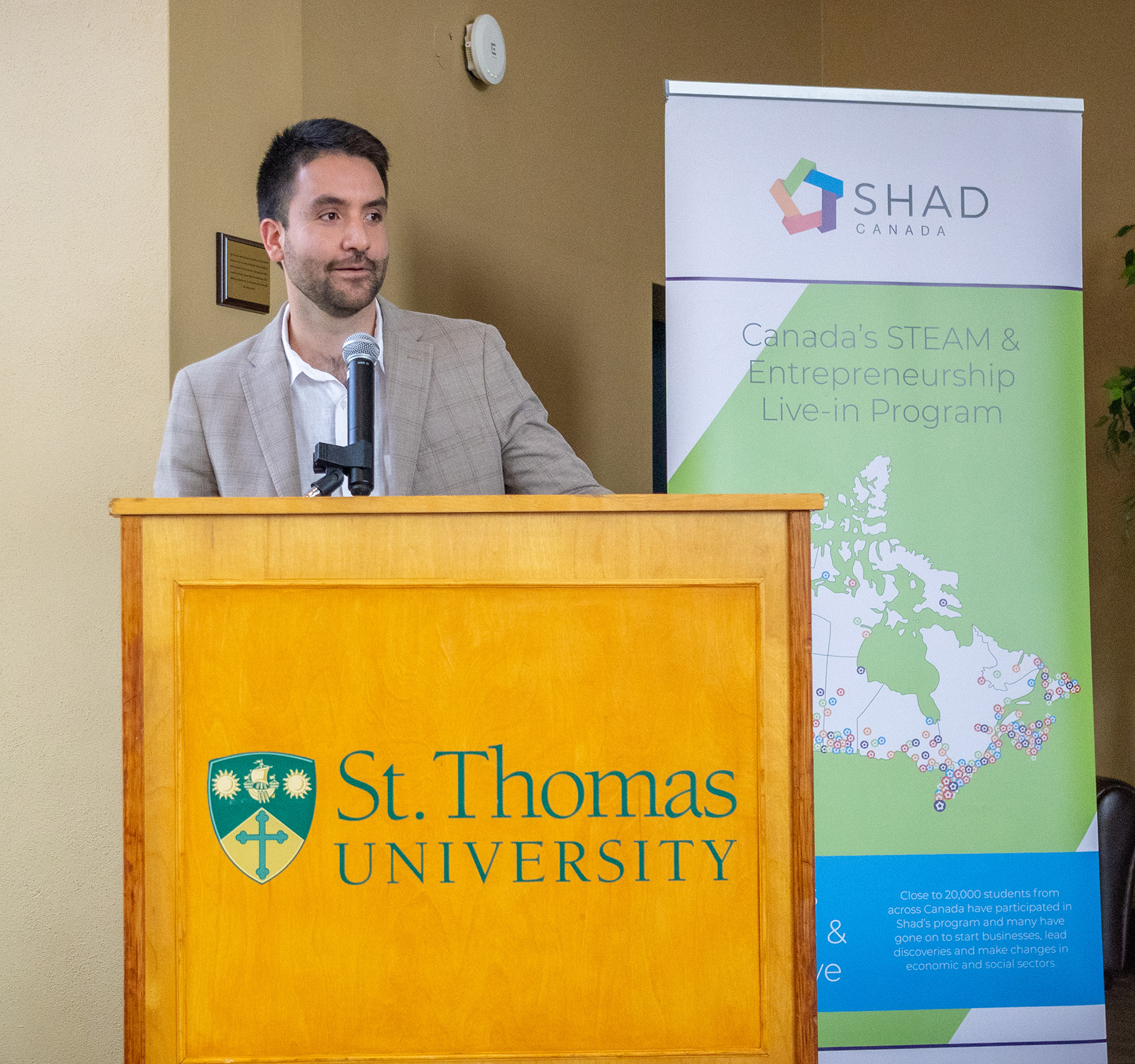
Jimy Beltran, STU alumnus and Program Advisor at the Canadian Forest Service recently spoke to high school students at STU about technology and the liberal arts.
After I graduated from STU, my first job was at a small AI startup.
We applied computer vision AI models to the dairy industry, developing a sensor that captured images from milk samples. These images were analyzed to extract data, which we shared with farmers to help them make better management decisions.
Back then, my colleagues and I imagined a broader future, one where AI could accelerate medical discoveries, optimize food production, and transform how we understand our bodies and our climate.
That future is no longer just imagined; it's very much real.
Pharmaceutical companies are using AI to accelerate drug development. AI is helping climate scientists model environmental systems. It's optimizing supply chains, reducing waste, and detecting signs of disease in radiology scans.
The possibilities seemed endless and exciting. But then I became a father.
What Happens When We Outsource Our Thinking?
As I held my son for the first time, my imagination slowly shifted. I stopped asking what AI could do, and started asking a more human question: “What kind of world do I want my son to grow up in?”
MIT recently published a study showing that students who used ChatGPT to write essays showed significantly reduced brain activity compared to those who wrote without AI assistance.
When we let machines think for us, we inevitably think less ourselves.
And that’s what began to worry me. Not that AI might take over, but that it might keep us from thinking, and in doing so, cause us to forget what it truly means to be human.
Education is the pinnacle of human achievement. It’s not just books and science experiments, but how we transmit wisdom, pass on values, and shape souls by helping us learn how to think.
But what happens when we begin outsourcing our thinking? When processes are so simplified and automated that we lose the rigor, nuance, and understanding that education should encourage us to pursue?
Where the Humanities Come In
Aristotle said that education should not only aim at knowledge, but at forming virtuous human persons; citizens who understand what it means to live a good life.
A good life is not measured solely on efficiency or productivity. It’s one shaped by contemplation, empathy, creativity, and moral responsibility.
The human mind is not just a processor of information. It is a seeker of meaning and understanding of truth in the world. It longs to participate in the act of creation, an undertaking that is difficult.
Yet in an age of accelerating AI, creation can become so effortless that it loses its depth and meaning, eroding our intellect not only by diminishing our capacity for critical thought, but by erasing the very skills, such as writing, that teach us how to think in the first place.
In doing so, we risk stunting our pursuit of the good life, forgetting that learning is a journey, not merely an output.
Many students today pursue STEM degrees, driven by the ambition to stand on the cutting edge of science, technology, engineering, and math, fields that will both shape and be shaped by AI. Yet literature offers a word of caution.
Consider Mary Shelley’s Frankenstein, a novel that warns of what happens when ambition outpaces wisdom. When Victor Frankenstein meets his mentor, Professor Waldman, he encourages Victor’s pursuits saying:
“A man would make a very sorry chemist if he attended that department of human knowledge alone. If your wish is to become really a man of science, and not merely a petty experimentalist, I should advise you to apply to every branch of natural philosophy."
It’s good advice, but incomplete. Waldman never invites Victor to weigh his ambition alongside the pursuit of the arts, humanities, or moral philosophy. He fails to remind him that knowledge without wisdom can be dangerous, and that invention without conscience can create monsters.
Had Victor been encouraged to reflect on ethics, beauty, and the human condition, his outcome may have been very different. And so might ours.
Don’t Let AI Flatten Your Thinking
AI can be a powerful ally in helping humanity tackle its most difficult challenges. But it’s not enough to ask, “What can we build?” We must also ask, “What should we create?”
We must ensure that in making something intelligent, we do not become so reliant on it that we surrender one of the most essential aspects of our humanity: the ability to think for ourselves.
For thinking is more than problem-solving. It is the act of wrestling with ideas, of questioning, of imagining possibilities yet unseen. It is an act of creation.
Let’s not lose that in the pursuit of progress.
-(2).jpg)
/filters:format(webp)/prod01/stuca/media/stu/site-assets/images/features/DalCupnews.jpg)
/filters:format(webp)/prod01/stuca/media/stu/site-assets/images/events/Research-and-Ideas-news-2026.png)
/filters:format(webp)/prod01/stuca/media/stu/site-content/news/DeansListnews.jpg)